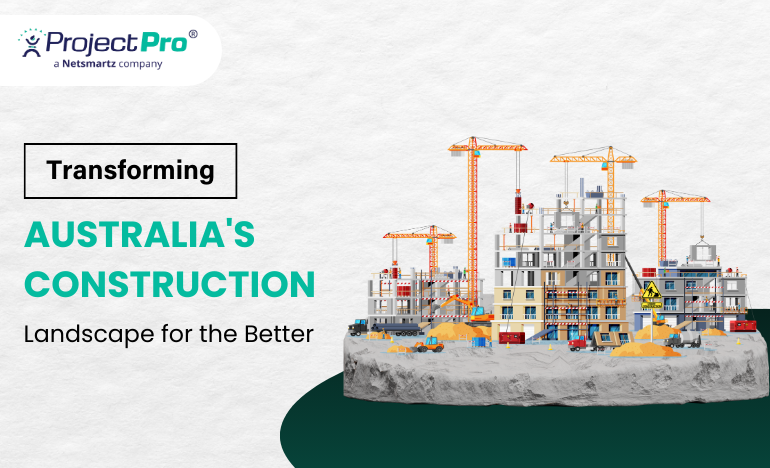How digital transformation in construction is breaking the mold?

The digital transformation in the construction industry is now picking up steam and is taking huge leaps towards digitization. New models and the workforce are changing the rules of the game. Digitization is changing the construction landscape as the need for productivity improvement propels construction firms to start automation of manual tasks.
For a long time, construction companies were slow in technology uptake. In fact, they were seen as less vulnerable to disruption, despite contributing 13% of global GDP. Sure enough, the ongoing pandemic forced construction firms to break the mold and deploy technology to solve their operational woes.
New entrants in the field of construction have realized that the $10 trillion per annum industry is at the cusp of realizing the potential of technology. Builders can now reduce cost, improve safety, accelerate projects by tech adoption and emerge successful leaders.
Moreover, decision-makers within the construction ecosystem are realizing digitizing can help them save crucial time and money. Hence, the construction business is primed to unlock potential benefits and has entered an exciting era.
How tech-driven construction business is fueled for growth?
Before digitization, the construction industry was fragmented, along with a ready supply of labor that often pursued the one-off approach of design-and-build projects. The way it is playing out technology will have an impact on every aspect of construction from design to materials and is set to break ground.
Earlier fewer construction firms had little to show in terms of their technological investments. Besides contractors battled with project delays and there was initially no way to develop tools and struggled with new methods that they can apply repeatedly. But, by embracing new methods and software solutions they stand to realize a significant productivity payoff than before.
Today, more and more real-estate developers wish to capture the full benefit of digital than they were prepared a decade ago. From being stuck in an analog era, a lot is changing as unique construction-specific software takes care of many project management needs. This in turn is resulting in profitability and breaking the wheel by automating many manual tasks and saving time spent on spreadsheets.
Implementation of digital solutions for productivity gains
To change the age-old mindset of doing tasks manually firms have realized that there is a lot at stake. In order to thrive in a competitive environment, construction companies want to generate value by eliminating unproductive time.
Construction business which is more prone to safety issues, health hazards, and unforeseen issues needs to make itself future-proof. This can only be done by seizing opportunities in today’s construction ecosystem by rapidly leaning on technological support.
With the help of construction accounting software like ProjectPro that has in-built artificial intelligence (AI) functions coupled with enterprise resource planning (ERP), customer relationship management (CRP), and project management features, decision-makers can take meaningful decisions.
For added productivity, ensuring efficiency, payroll processing, and scheduling tasks more businesses are taking the digital route to stay and win. Gone are the days where are contractors will spend numerous hours on time-consuming spreadsheets. And incumbents can capture that slice of value now for more gains.
Key benefits of digitalization in construction
There are many benefits of digitalization in construction but foremostly it makes the project life cycle more efficient. Apart from streamlining business and making operations smooth, it gives construction companies a competitive edge.
The industry has come a long way from being notoriously slow in technology adoption to reaping significant dividends by deploying cloud-based applications. To stay ahead and solve challenges within the construction ecosystem, tech-driven solutions will be a game-changer. Here are the key advantages of going digital:
1)Assists in precise cost projections
As construction firms have battled with razor-thin profit margins in the past, there is now available all-in-one construction accounting software like ProjectPro that can provide precise projections on costs. With the help of job forecast worksheets, builders can track and monitor costs and project progress.
2) Streamline your business
Software solutions can help provide meaningful insights on construction estimating, resource allocation and requirement, job materials planning, and strengthen control on projects. With the help of cloud-based solutions that ensure mobility and provides access to data from anywhere, anytime. Apart from that integrated data coupled with intelligent transaction processing features is helping construction businesses to streamline processes and operations.
3) Real-time collaboration with the help of technology
By scheduling tasks, planning in advance, and also collaborating in real-time keeps the communication going. This removes bottlenecks and prevents project delays and is a boon where projects used to be marred by a slow decision-making process in the past.
4) Keep the project on time
By relying on technology, one can take quick decisions based on data by having access to the latest documents and plans and Gantt charts. Features like payroll processing, financial risk analysis, and robust reporting capabilities can help contractors meet strict timelines to complete a building project.
5) Ensuring Productivity levels
Tech deployment is helping contractors deal with complex projects. Project management software and building Information modeling (BIM) are powerful tools that have helped construction companies to get out the shadow of the past. Construction methods like design-build and software with job forecasting and subcontract management are ensuring added productivity and future profits.
Way Forward
Instead of redoubling manual efforts, the time has come where automation will be a key driver of growth. It is a fact that digital transformation in the construction industry will yield tangible benefits. Implementing and investing in digital technologies will continue to be advantageous and propel construction firms to be more collaborative and efficient.
A constellation of connected solutions is emerging and will help contractors make bold moves in the times to come. Going digital can give remodelers insights into operational aspects that need digitization. In fact, contractors can now create advantages and drive productivity and quality through the industry by avoiding delays, errors and rework.
From the least digitized industry to the one that is fixing pain points by going digital, the construction industry will continue to bridge the gap and improve performance in the future.




.jpg)


